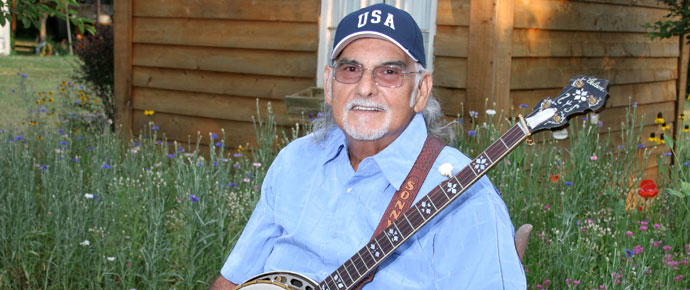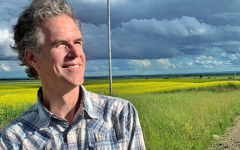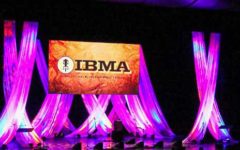
Good morning Chief, I know you said it would be a cold day before you ever got back onstage again, but according to Larry’s super fancy Apple watch, it’s 29.8º out here this morning…does that qualify?
Ahhhh okay, you don’t really need to get back onstage, but come on out to the bus and tell us about the days you spent there. We’re heading back to the ’60s today with a question about Rocky Top and some of your memories of brother Mac Wiseman. Boy, we sure do miss him. Larry’s got the heater turned up to a cozy 74 in here and Lincoln just grabbed your box lunch from Judy. You know, you’ve got a good woman there Chief!
T.
Well I’m gettin’ ready to get on the bus once again. And I see that we have Trent, and Jake, Rob, Billy and over there sits ole Pete. Boys, I’m gonna tell you something right now. You’re gonna have the surprise of your life when you watch Larry get this ’45 monster down that driveway without tearing trees up, and then when we get back, to watch him back it up this same driveway. Frightening. But he can do it. All them boys and my crew is here too. Lincoln, Aynsley, Derek, and Dan, and I’m well aware of how important Judy has been. See, I’m in one room dictating what to type and she’s in another room typing it. Try doing that sometime with a Hungarian-tempered woman…. ‘taint easy boys, ‘taint easy.
==================
Hi again Sonny, I have been digging back into old Starday records recently, and I’m wondering your opinion of them as a label, particularly in the early to mid ’60s with all the zany album covers and concept albums. They surely put out a lot of bluegrass material. What was the perception of them in the industry back then?
Trent J.
Trent, you asked me about Starday Records and I know a little bit about Starday, not a lot. It was started in Beaumont, TX in 1952 by Pappy Dailey and Jack Starnes. Starnes was Lefty Frizzel’s manager, Pappy Dailey managed George Jones’ early career. I’m not going to go into the full history, but Starday had some monster hits in the ’50s and ’60s. Bluegrass-wise, they had The Stanley Brothers, The Country Gentlemen, and I think Don Reno and Bill Harrell.
When Starday opened in Nashville it was run by Don Pierce, and Tommy Hill worked there (Goldie Hill’s brother), and Martin Haerle first came onto the scene. Starday resurrected the careers of Red Sovine, Johnny Bond, Cowboy Copas, The Stanley Brothers, and others. They were big during the ’50s and ’60s.
Martin and Guitar Boogie Smith were the founders and owners of CMH Records, and of course we know CMH had Don Reno, Benny Martin, Eddie and Martha Adcock, Mac Wiseman, The Osborne Brothers….. CMH Records sounded professionally produced while Starday did not. This is strictly my opinion.
Thank you Trent for your participation.
S
—–
Sonny,
In the years since you retired, do you miss playing your banjo – just for yourself, just for the pleasure? (I understand that physically you are no longer able to play). Or, as a professional with decades of picking under your belt as your job, did you have enough banjo playing by the time you stopped and retirement means retirement? I ask because, as a complete amateur banjo player for the last 48 years, I would really miss playing my banjos if I had to stop and could never play again. Just wondering how it is for you professionals.
Peter M.
Now old Pete asked me about being retired and did I miss playing the banjo, specifically a 1934 Granada
I do miss the sound of that banjo. I can’t play at all due to shoulder problems and other health issues. But occasionally Lincoln and Derek happen by and they play it for a little while, and I can hear its beautiful sound through them.
As a lifetime professional banjo player, for nearly 60 years, at times it was a job and at other times it was just the love of hearing that sound. And you also wondered whether I ever just had enough banjo playing, and I’ll have to answer that yes and no, because when it got to the point where I couldn’t go on, I started hearing that sound in my head again and I wound up playing a little more.
I’ll tell you though, Pete, when I first realized I could play no more, for a short time it was a problem, but then with all that said in the end I was ready to retire. And I knew it because things that were relatively easy to play became a bit more difficult, and other than just playing, I had to think about it.
But, retirement is good.
S
—–
Sonny,
I hope you are doing well, sir. I appreciate you taking the time to answer all of our questions each week.
I noticed that Rocky Top was released on Christmas Day in 1967. I thought Christmas was an interesting release day for any song, much less one that is not related to the holidays in any way. What was the reasoning behind Decca releasing it on Christmas Day, and did you ever have any reservations or ambitions about this release date?
With all of the many artists that have covered it, recognitions, awards, and attention around college football, FBI missions, and state songs, it has to be one of the best Christmas presents ever!
Thank you for your time, sir.
Jacob H.
—–
Jacob, I’m glad you’re here with us today, and I’ll try to answer your question. Rocky Top was released on Christmas day 1967 and to this day, no one knows why. I’ve been involved with record companies for over 65 years, and have yet to see a release date of December 25. I have asked, with no answer, as to why Rocky Top was released on that day. I wish I could be more helpful, but I can’t.
My honest opinion is that Decca did not realize what they were doing. In retrospect, and looking at what Rocky Top did for us, and bluegrass music in general, I would say that the December 25th Christmas release date was the greatest gift anyone could ever receive, especially if your business is music and selling records. That being the case, it was a game-changer.
Thank you for participating in our little free-for-all.
S
—–
Dear Sonny,
Greetings from British Columbia, Canada. I love bluegrass and your music in particular, especially that great The Essential Bluegrass Album you guys made with Mac Wiseman. I was only 5 years old at the time and discovered it as an adult. It sounds unlike anything else and is one of my favorite albums of all time. How did that collaboration come about? And how did you feel at the time about the “New Grass” movement that was emerging in the late ’70s? Thank you and long may you run.
Rob L.
Salmon Arm, BC
OK Rob, from Salmon Arm, BC. You know what Rob? I don’t know where that is. You mentioned the Mac Wiseman album we did together and you said you were only 5 years old at the time? And you discovered it as an adult? Well Sir Rob… How’d you do that? Man when I was 5 years old… well I don’t want to talk about that.
The Mac Wiseman album gave Bobby and me the golden opportunity to sing again with Benny Birchfield. Benny helped us in the early ’60s to establish The Osborne Brothers trio as one of the best. He and Dale Sledd helped us win the CMA Vocal Group of the Year award in 1971. It was an extreme pleasure to have Benny sing with us on this album.
That too is one of my favorite all-time albums that we ever did. It was fun recording it, and I would imagine I’ve listened to that album at least a hundred times and it never gets old.
One of my all-time favorite songs is Shackles and Chains, especially how Bobby and Mac did it. Blaine Sprouse played fiddle and the great Bob Moore played bass. Everything on that album just came together perfectly.
You asked how that collaboration came about? It was quite simple. We asked Mac if he’d do it. He said yes. Period.
You also asked how I felt about “New Grass,” and honestly, I never listened because I was so focused on what we were doing, nothing else was important to me and our career.
Thank you, Rob, for joining in here. (Salmon Arm, BC wonder where that really is?)
S
—–
Sonny,
Having seen you, Bobby and the boys numerous times down through the years, I was always impressed with how much fun you were having on stage. I’m curious, which song (or songs) did you look forward to the most each performance – and why?
Billy
You wondered how we had so much fun onstage. So imagine yourself onstage with some of the best musicians in the world and they happen to be YOUR band. So tell me, Bill, how could you not have a good time when everyone up there was the best at what they did?
So, you also asked which songs that I looked forward to playing almost every night. I’ll tell you now, there were many. Paul Brewster singing Shackles and Chains or Too Old to Die Young; Terry Eldredge singing Green Light; our trio doing My Favorite Memory and Today I Started Loving You Again; and having Gene Wooten doing a break on that last one. David Crow playing Listen to the Mocking Bird or Terry Smith standing back there playing the bass fiddle better than anybody else in the world. J.D.Brock taking that break on Hear the Whistle Blow. Or getting on the bus and being able to relax while Raymond Huffmaster drove you to the next date.
With all those things considered, how could you not have fun on a nightly basis? …. and how about Pathway of Teardrops? Lawd how moicy…Git away’m hyer!!
Thank y’all for a wonderful ride.
Now we get to watch Larry back this monster up his driveway.
See you next week.
S
If you have something you would like to ask Sonny, be sure to post it in the comments below, or send it to us directly







